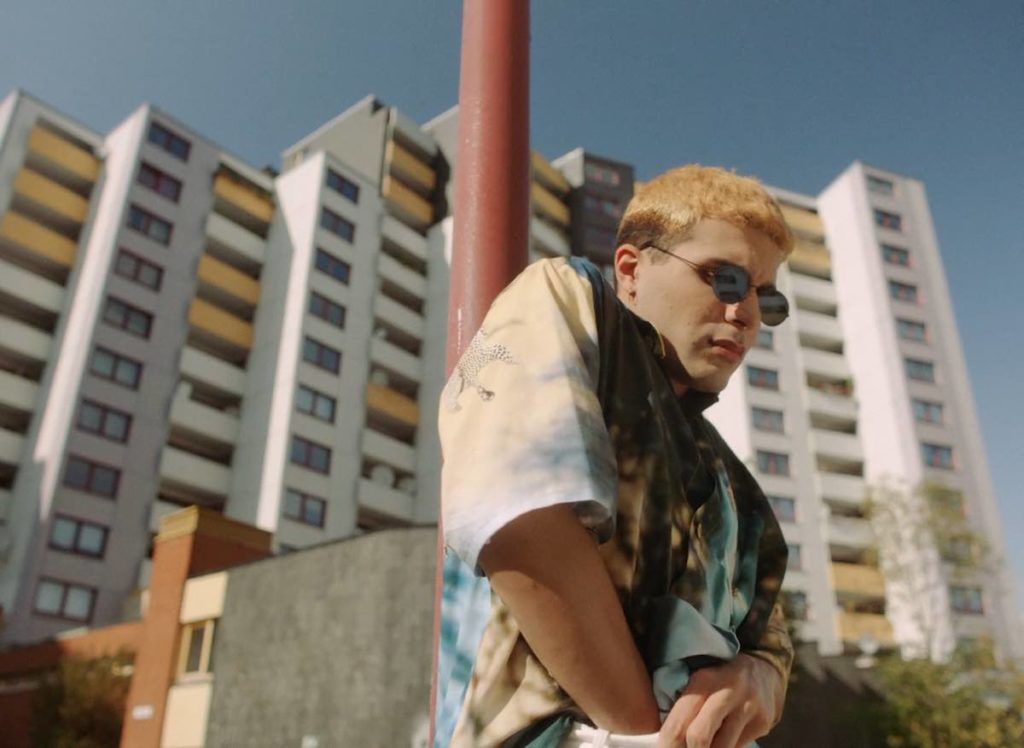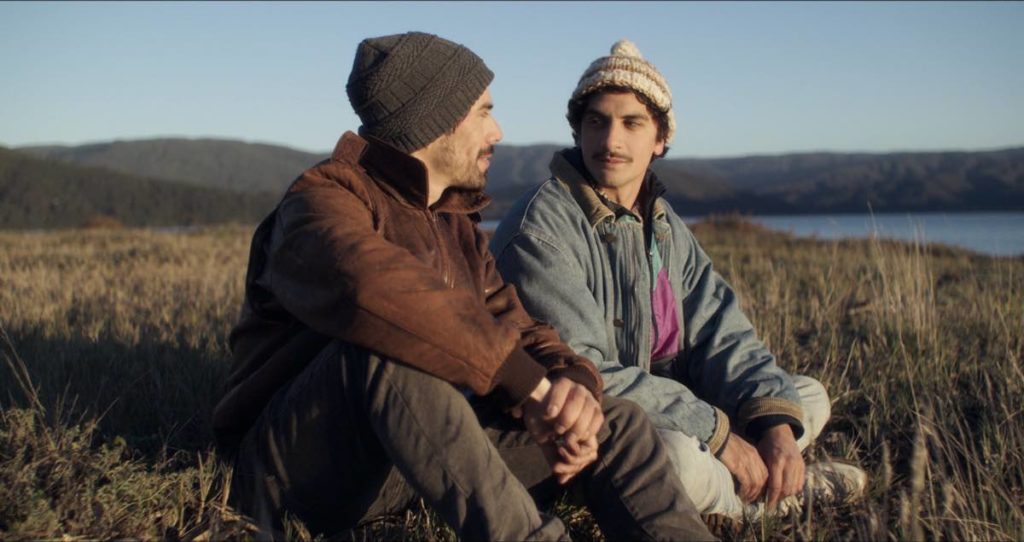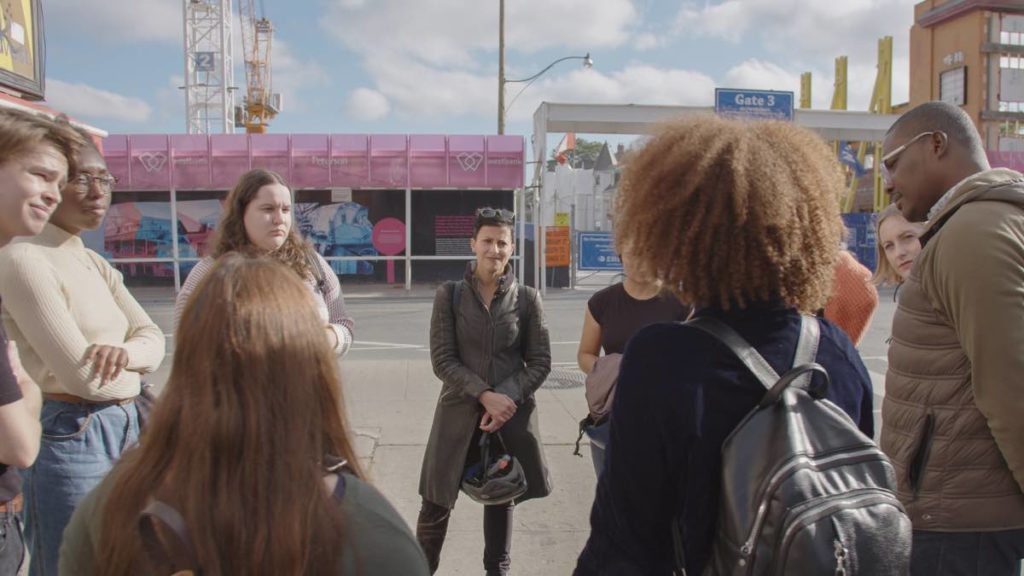No Hard Feelings and The Strong Ones are two must-see films at the InsideOut Film Festival this weekend. We also review Canadian docs Sex, Sin, & 69 and There’s No Place Like This Place Anyplace

As the InsideOut LGBTQ+ festival wraps up this weekend, here’s a look at some highlights of the festival, from Germany, Chile, and Canada, including No Hard Feelings and The Strong Ones. Together, these films document queer history, and tell stories of love and finding acceptance. We previously recommended Rurangi, No Ordinary Man, Cowboys, Shiva Baby, Ellie & Abbie, and Dating Amber — all of which are available online until October 11. Tickets are $9.77 each.
No Hard Feelings

Does anyone ever really feel like they fit in? For the first and second generation Irani-German immigrants in Faraz Shariat’s No Hard Feelings, there’s always a sense of displacement. German-born Parvis is out and proud as a queer man, but hookups often tend to include casual racism (the film’s title comes from Parvis’s amazing rejoinder). Although Parvis speaks Farsi, he stopped calling himself Iranian after visiting Iran, so aware is he of the limits of his Farsi pronunciation and alienation from his parents’ culture. By contrast, his parents, who moved to Germany to give him and his sister a better life, have never felt at home in the place where they live: their English is imperfect and they’re always longing for the home they left. Shariat often places his characters at opposite ends of the already boxed in 4:3 frame to show the gulf between them.
While doing community service, Parvis meets a newly arrived Iranian brother and sister, Amon (Eidin Jalali) and Banafshe (Banafshe Hourmazdi), both of whom are seeking asylum, he discovers that they, too, feel displaced. Amon is gay, and so is finally free to be himself in Germany, but is uncomfortable speaking German; Banafshe is in danger of being deported. The siblings and Parvis soon become an inseparable threesome, finding in each other the acceptance that they never fully got in Germany or Iran. Parvis finds a relationship with intimacy and depth in Amon; Amon finds in Parvis a German who understands all the different facets of him; and Banafshe finds a second brother, a family away from home, in Parvis and his family. The film is the story of the trio’s budding relationships, a quietly observed character drama that’s utterly absorbing. Shariat makes some bold directorial moves toward surrealism in the film’s final act, an interesting if not always effective choice, but otherwise, this is a thoughtful, naturalistic drama about figuring out who you are and where you fit.
No Hard Feelings won the Teddy Award at the Berlin Film Festival earlier this year, and also picked up the InsideOut Award for Best First Feature. It’s a must-see at the festival. Expect to see it continue to make the rounds on the LGBTQ+ festival circuit.
Sex, Sin & 69

Sex, Sin & 69 is a Canadian documentary by Sarah Fodey about reclaiming queer Canadian history in the wake of the decriminialzation of homosexuality back in 1969. It’s part of a recent trend of Canadian documentaries — including No Ordinary Man, Inconvenient Indian, and John Ware Reclaimed — that aim to tell a previously untold part of the history of a marginalized. While Sex, Sin, & 69 lacks the formal inventiveness of these other films, it’s an effective document of the struggles and activism of the queer community, as told by some of the key players in that history who are still alive today. It’s mostly talking heads, and an animated timeline, but there is something powerful about giving authority to the people who were there and often unable to tell their story in the mainstream media (or historical account).
The Strong Ones

Omar Zúñiga’s The Strong Ones is like a Chilean Weekend, with less talking and more physical intimacy, set against the beautiful rural coastline of Chile. The Strong Ones screens at InsideOut after picking up the Audience Award at LA’s Outfest, and it’s a quiet, romantic, if bittersweet crowdpleaser. The gorgeous, bucolic setting — the rocky ocean beach, the greenery that surrounds them — and the film’s unhurried pace creates a tranquil space to watch two people fall in love who may not be best-suited outside of this idyllic bubble.
When Santiago-based Lucas (Samuel González) heads to the small-town where his sister lives for a visit before leaving for Montreal for graduate studies, he meets boatswain Antonio (Antonio Altamirano) and it’s attraction at first sight that quickly turns into something more. Having fallen out with his bigoted parents, Lucas is desperate for an escape from home and the machismo culture that means it’s not always safe to be out and proud — a danger that’s always just under the surface in the film. Antonio, by contrast, is content living in a small-town, working odd jobs from fishing to historical reenactments, spending time with his grandmother, and keeping his sexuality quiet if not a total secret. In each other, they find tenderness and acceptance, which makes Lucas question whether an escape is really what he needs. While class differences ultimately affect what they want and divide them, the few weeks they spend together in The Strong Ones are sweet and lovely.
There’s No Place Like This Place, Anyplace

Lulu Wei’s HotDocs hit, There’s No Place Like This Place, Anyplace, about the birth and death of Honest Ed’s and what’s in store for the future of Toronto’s Bathurst-and-Bloor intersection, is not so much queer-themed as queer-made. When Wei started making the film, she and her girlfriend lived next door to Honest Ed’s, a 75-year-old Toronto institution where you could buy household goods and food for very cheap. The film charts the closing of the landmark store, the property’s sale to a Vancouver development company, and the changes that ensued in the neighbourhood, as people like Wei — and other artists — were kicked out of their homes and studios so they could be turned into a new development.
There’s No Place Like This Place, Anyplace is best as a real-time document of the changing, gentrifying city, as Wei shows us, through drone shots and on-the-ground footage, the destruction of Honest Ed’s, the building site, and the people who inhabit the area. She introduces us to some of the locals most affected by the development, from gallery owners who lost their space, to the owner of the Black bookstore, Another Booklist, currently housed across the street from where Honest Ed’s used to be. But the film starts to lose its footing when Wei tries to make sense of why it matters to her that the city’s changing and how that has affected her personally, concluding that she feels accepted in Toronto without ever explaining to us why this city and community have been important to her. Still, like Sex, Sin, & 69, it’s a wonderful document of a place that one hopes time won’t forget, including archival footage of the early days of the store and a sense of what it’s meant to immigrants, including Wei’s family.

